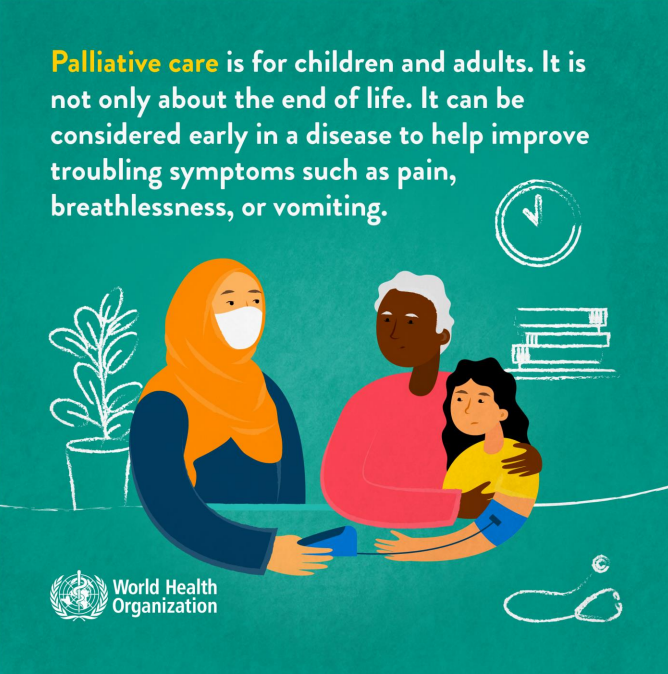The Early Career Nurse (ECN) Blog is full of advice and inspiration on how to move your career forward and build the future of cancer nursing in your country. Happy reading!
Palliative Care in Oncology: Going Beyond Treatment
Giannis Polychronis, EONS YCN representative

Picture source: World Health Organization (WHO, 2020)
In oncology, a patient’s treatment plan often involves various measures, such as surgery, chemotherapy, and radiation, to eliminate the cancer. Palliative care, which is sometimes less visible, is one crucial aspect of cancer care that affects the quality of life of patients and their families.
Palliative care refers to specialised medical care provided to individuals with serious illnesses. The aim is to improve the quality of life of patients and their families. In the field of oncology, palliative care extends beyond treatment, providing a source of comfort, dignity, and hope during the most challenging times.
Embracing the Journey
The essence of palliative care in oncology is its patient-centred approach, emphasising the treatment of the person as a whole rather than solely focusing on the disease. This approach is grounded in preventing or treating the symptoms and impacts of the disease and its treatment, as well as addressing any related psychological, social, and spiritual issues as early as possible (National Cancer Institute, 2021). By integrating the patient as an active participant within the healthcare team, palliative care ensures that the journey through cancer is as comfortable and meaningful as possible, reflecting a holistic commitment to patient well-being (Buljac-Samardzic et al., 2022).
Physical comfort is of utmost importance for patients, which is why palliative care teams work tirelessly to manage pain and other unpleasant symptoms including fatigue, nausea, loss of appetite and difficulty sleeping. Palliative care can assist patients in maintaining their strength and better tolerating their treatments, thereby alleviating these symptoms.
Individuals and their loved ones experience a range of emotions from diagnosis to the end of treatment. Palliative care offers a caring atmosphere to address fear, anxiety, depression, and other emotional difficulties. Psychologists provide specialised support and coping mechanisms to help patients and their loved ones. It also places importance on clear communication of the needs and desires of those affected. Spirituality often emerges as a critical concern during illness and palliative care teams are committed to honouring and supporting individuals’ spiritual well-being by helping them find peace and meaning that aligns with their beliefs.
Palliative care’s broad support network acknowledges the comprehensive impact of illness on families and caregivers. It extends beyond medical needs, covering practical issues such as care coordination, financial planning, and linkage to community resources, ensuring a supportive family environment. Palliative care includes a variety of supportive therapies, from physical rehabilitation to enhance mobility and relieve discomfort to complementary practices that support overall well-being. This ensures a holistic approach to caring for those receiving treatment. These treatments are carefully integrated to improve well-being, mitigate symptoms, promote relaxation, and facilitate physical fitness and emotional healing.
This multi-faceted approach embodies a holistic and inclusive model of care, recognising and respecting the individual journeys and diverse needs of those navigating severe illness.
A Misunderstood Specialty
Evidence underscores the positive impact of palliative care on both the wellbeing of individuals and their families. Despite its apparent benefits, palliative care is often misunderstood. Many perceive it as solely end-of-life care, overlooking its broader scope. Recent studies have indicated that introducing palliative care early in treating advanced cancer can significantly enhance the quality of life and mood and even extend survival (Temel et al., 2010). The American Society of Clinical Oncology advocates integrating palliative care into the standard care for all individuals with advanced cancer (Ferrell et al., 2017).
Further research, such as the study by Boddaert et al. (2024), demonstrates that individuals with cancer who engaged with specialist palliative care services early were 45% less likely to receive inappropriate care towards the end of life. This emphasises the importance of integrating palliative care within treatments from the beginning. It helps individuals cope with treatment side effects and navigate the healthcare system effectively.
Conclusions
As the medical community continues to recognise the significance of palliative care, it is increasingly becoming an essential component of comprehensive cancer care. The future of oncology encompasses a holistic approach that combines treating the disease with caring for the patient’s wellbeing. Integrating palliative care into standard oncology practice is a positive development that can enhance quality of life for cancer patients and change the way we think about cancer treatment. The journey of battling cancer is just as valuable as the destination we strive to reach.
References
Boddaert, M. S., et al. (2024). Association between inappropriate end-of-life cancer care and specialist palliative care: A retrospective observational study in two acute care hospitals. Cancers, 16(4), 721. doi:10.3390/cancers16040721
Buljac-Samardzic, M., Clark, M. A., van Exel, N. J. A., & van Wijngaarden, J. D. H. (2022). Patients as team members: Factors affecting involvement in treatment decisions from the perspective of patients with a chronic condition. Health expectations: an international journal of public participation in health care and health policy, 25(1), 138–148. https://doi.org/10.1111/hex.13358
Ferrell, B. R., Temel, J. S., Temin, S., et al. (2017). Integration of palliative care into standard oncology care: American Society of Clinical Oncology Clinical Practice Guideline Update. Journal of Clinical Oncology, 35(1), 96-112. doi:10.1200/JCO.2016.70.1474 National Cancer Institute. (2021). Palliative care in cancer. Retrieved March 6, 2024, from https://www.cancer.gov/about-cancer/advanced-cancer/care-choices/palliative-care-fact-sheet.
Temel, J. S., Greer, J. A., Muzikansky, A., et al. (2010). Early palliative care for patients with metastatic non-small-cell lung cancer. New England Journal of Medicine, 363(8), 733-742. doi:10.1056/NEJMoa1000678
WHO (2020) Palliative Care What you need to know. Available at: https://cdn.who.int/media/docs/default-source/integrated-health-services-(ihs)/palliative-care/palliative-care-essential-facts.pdf?sfvrsn=c5fed6dc_1 (Accessed: 06 March 2024).